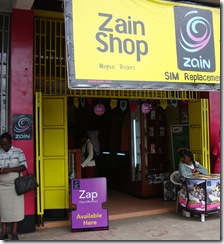Over the past six years, Zain Group has been a significant contributing party to the corporate strategy guide for network operators in the MEA region. From its aggressive M&A activities at times, to its technology leadership and branding prowess, Zain has become a bellwether for operators across the region. Bashar Arafeh, Zain Group’s chief commercial officer gives his perspective of the main trends currently facing the sector from an operator perspective in the MEA 
Arafeh’s main message to network operators is not to be myopic. He says telcos are in the telecom business not the mobile operator business and as such they should be open to new business opportunities
At the end of January Zain Group announced the launch of m-wallet services in Jordan, the first country in the Middle East region to receive them. Zain expects to export the platform to its other regional markets in due course, and Bashar Arafeh believes the area of mobile money offers a great offensive play for mobile operators in emerging markets.
“The opportunity for the uptake and success of mobile money is inversely related to the development of the country,” Arafeh says. “The less developed the infrastructure of a country, the less well-developed the banking infrastructure, which in turn gives rise to a greater opportunity for mobile banking to have a significant impact.”
The amount of money circulating outside of the official banking system is huge, particularly in Africa, and mobile operators are uniquely positioned to bring banking services to previously unbanked users in a manner that was not been previously possible.
In Africa, where Zain Group sold its operations to Airtel last year, the Kuwait-listed operator had prior to the sale developed and launched its Zap m-banking platform across a number of countries on the continent. By the start of 2010, Zain announced it had extended its Zap footprint to include Niger and Sierra Leone, with a full commercial pilot taking place in Malawi. Those developments had followed the launch of Zap in February 2009 in Kenya, Tanzania and Uganda, where more than 10 million people used the service within the first six months of launch.
Subscribers could use their Zap-enabled mobile phones to withdraw cash or pay for goods or services such as school fees and utility bills; to send and receive money between people; to access funds and manage their bank accounts, as well as top-up their own or somebody else’s airtime.
“When mobile money services were first introduced in Africa some years ago, they were launched mainly as a differentiator and a subscriber retention tool, rather than a genuine source of incremental revenue for operators,” Arafeh says. “Now, however, with 9-10 million users signed up to a service like in Kenya, it is clear that mobile money has become a genuine and significant revenue generator for telcos.”
Indeed Zap’s expansion into different parts of Africa came in direct competition with MTN Group’s efforts. The South Africa based operator announced its MobileMoney service in March 2009, one month after Zap’s initial launch, claiming the largest deployment of mobile wallet services at the time. The deal was worth US$9.7 million and aimed to enable more than 80 million MTN subscribers across 21 countries in Africa and the Middle East to access mobile banking services.
“In the Gulf region, international remittances are the big opportunity within mobile money,” Arafeh says. “The large numbers of expatriate residents make it an obvious prospect and Zain will continue to develop its platform to cater for changeable requirements.”
With over 12 million Zain mobile subscribers signed up in Iraq, and notoriously poor banking infrastructure present in the country, Arafeh says mobile money services in such markets could have a real impact on service bottom and top lines, if implemented correctly.
The growth in competition, both from rival telcos as well as new entrants expanding into the telecom space, is an ongoing challenge that Arafeh says operators shall need to adapt to, or run the risk of failing as businesses. He believes network operators are required to bring value to the table in order to prevent relative new entrants to the telecom ecosystem such as Apple and Google, from establishing strong direct relationships with end-subscribers, to the detriment of network operators.
“Network operators need to remain confident of their assets and their unique and influential position in the value chain,” Arafeh asserts. “Operators know much more about the behaviour and spending patterns of end-users, and I think that the area of data intelligence is going to become a bigger and bigger play for network operators in the future.”
Thus Arafeh forecasts that network operators shall evolve to become data intelligence warehouses that sit between entities such as Google and Apple, and end-users, all the while looking to extract value from playing the role of intermediary.
“I think that Zain is agile enough to transform as required,” Arafeh says. “I think the main message I would send out to network operators in the region is not to be myopic. We are in the telecom business not the mobile operator business and as such we should be open to new business opportunities.”
For its part, Zain has been transforming from primarily being a mobile operator, to becoming more of an integrated provider, in much the same way that Vodafone has been doing for some years now. Expansion into fixed-line activities has seen Zain start to add corporate MPLS and cloud computing to its offerings, with the integrated model of its operation in Jordan being its guiding example.
“Becoming a total provider is the name of the game,” Arafeh says. “Transformation and the redefining of parameters is an ongoing process at Zain.”
Mobile advertising is another area that Arafeh believes could benefit network operators more in the future, as the nature of their direct relationship with end-users is invaluable to prospective advertisers. He forecasts that it shall become a big thing eventually, but that network operators need to safeguard the preferences and privacy of end-users at all times.
Arafeh also considers the growing penetration of smartphones, together with the number of services and applications they are powering, to be a great growth opportunity for network operators, particularly as the industry looks to bring down the cost of a smartphone to below US$100.





0 comments ↓
There are no comments yet...Kick things off by filling out the form below.
Leave a Comment